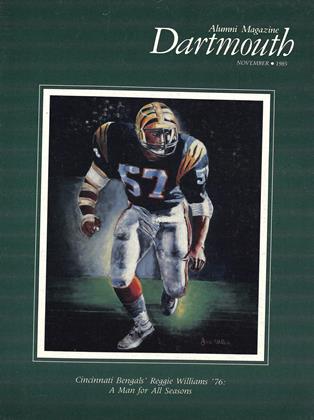Kevin Killarney '85 graduated from Dartmouth College last June, almost two decades after he entered as a freshman.
In between his freshman year and his senior year he was a Boston garbageman, a community organizer during Boston's school desegregation, an urban renewal official, and a high-level hospital administrator.
And he had a political life. His street-born political savvy generated roles as a ward coordinator for former Boston mayor Kevin White, field organizer for Massachusetts Governor Michael Dukakis, and deputy political director for Republican Elliot Richardson's bid for the U.S. Senate. He's also been involved in presidential and congressional political races.
In September 1968, South Boston's Killarney couldn't handle what he saw as a Dartmouth freshman. It was an anti-war campus, and frankly, Killarney felt more comfortable with his Southie friends who joined the Marine Corps. In May of 1970 he didn't bother to complete the year at Dartmouth but headed back to Boston to signup for the Corps.
Arriving back in Southie, Killarney was taken aside by four of his friends who had returned from Vietnam. For several days they told him of what they had been through and what the war was really like and finally succeeded in convincing him not to enlist.
Lost, and really disillusioned this time, Killarney worked for the next two years collecting garbage for the city of Boston. In 1973 he began working with the Boston Youth Activities Commission, during the height of the city's school desegregation pains. From there on, Killarney built a career within the city's bureaucratic and political structure, becoming assistant director of property management for the Boston Redevelopment Authority (the BRA), and later the administrator on duty for the Boston City Hospital.
He decided in 1979 to return to Dartmouth ("I always knew I'd come back," he said), applied for admission in 1980, and began commuting from Boston in January 1981. For two years he commuted 300 miles a week and still held a job in Boston. Later he gave up commuting and returned full time to the Hanover campus.
The collegiate beauty of Dartmouth is a far cry from the life Killarney led in Boston politics. For a period he lived in a cellar in Boston's Mission Hill area, a culturally mixed and politically hot area where Killarney worked for Mayor White as a ward coordinator. Killarney decided to live in the area "because it was important to establish my credibility, as well as White's." The Black, Hispanic, and Irish constituency began to see Killarney as a person who would follow through and not disappear after the campaign.
Killarney's rapport with the Sociedad Latino, a Hispanic community group, ultimately paid off for him and for the group. After three years of work, the Sociedad Latina gained a lease from the city for a gymnasium, a building that now serves as a community anchor in that Roxbury neighborhood. Killarney gained a deeper insight into the nature of political leadership.
The heavyset Dartmouth graduate's hair is now turning silver, and with his glasses and ruddy complexion he looks more like a priest than an undergraduate. He says now that Dartmouth admissions saw something in him in 1968 that he's just now beginning to fully understand.
Alex Huppe is director of News Services at Dartmouth College.
 View Full Issue
View Full Issue
More From This Issue
-
 Cover Story
Cover StoryA Man for All Seasons
November 1985 By Douglas McCreary Greenwood '66 -
 Feature
Feature"Shakespeare in Sable"
November 1985 By Errol Hill -
 Feature
FeaturePolitics in an electronic age
November 1985 By Jim Newton '85 -
 Article
ArticleConnie Lambert: Doyenne of "The Daily D"
November 1985 By Georgia Croft -
 Class Notes
Class Notes1978
November 1985 By Catherine A. Gates -
 Sports
SportsTough days on the gridiron
November 1985







